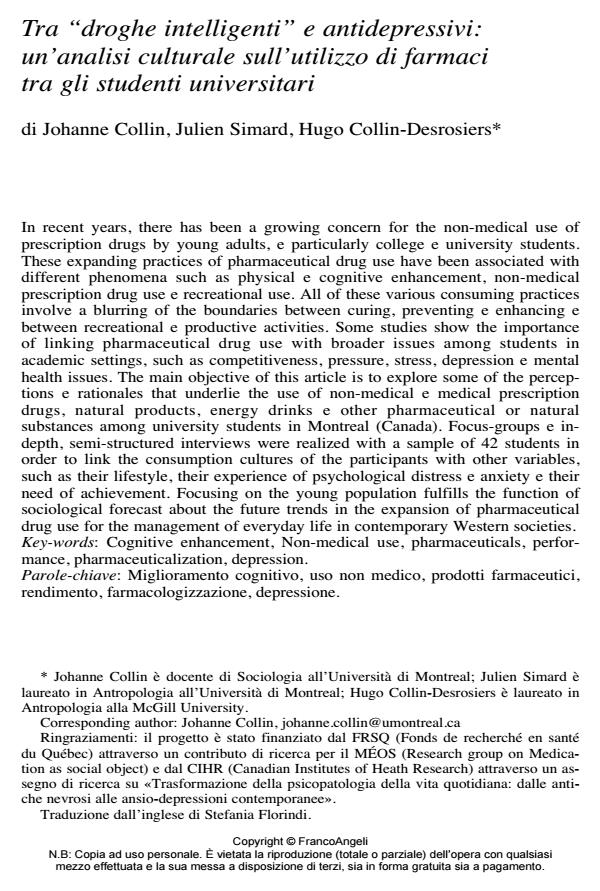Tra "droghe intelligenti" e antidepressivi: un’analisi culturale sull’utilizzo di farmaci tra gli studenti universitari
Titolo Rivista SALUTE E SOCIETÀ
Autori/Curatori Johanne Collin, Julien Simard, Hugo Collin-Desrosiers
Anno di pubblicazione 2012 Fascicolo 2012/suppl. 2
Lingua Italiano Numero pagine 25 P. 29-53 Dimensione file 148 KB
DOI 10.3280/SES2012-S02004
Il DOI è il codice a barre della proprietà intellettuale: per saperne di più
clicca qui
Qui sotto puoi vedere in anteprima la prima pagina di questo articolo.
Se questo articolo ti interessa, lo puoi acquistare (e scaricare in formato pdf) seguendo le facili indicazioni per acquistare il download credit. Acquista Download Credits per scaricare questo Articolo in formato PDF

FrancoAngeli è membro della Publishers International Linking Association, Inc (PILA), associazione indipendente e non profit per facilitare (attraverso i servizi tecnologici implementati da CrossRef.org) l’accesso degli studiosi ai contenuti digitali nelle pubblicazioni professionali e scientifiche.
In recent years, there has been a growing concern for the non-medical use of prescription drugs by young adults, e particularly college e university students. These expanding practices of pharmaceutical drug use have been associated with different phenomena such as physical e cognitive enhancement, non-medical prescription drug use e recreational use. All of these various consuming practices involve a blurring of the boundaries between curing, preventing e enhancing e between recreational e productive activities. Some studies show the importance of linking pharmaceutical drug use with broader issues among students in academic settings, such as competitiveness, pressure, stress, depression e mental health issues. The main objective of this article is to explore some of the perceptions e rationales that underlie the use of non-medical e medical prescription drugs, natural products, energy drinks e other pharmaceutical or natural substances among university students in Montreal (Canada). Focus-groups e indepth, semi-structured interviews were realized with a sample of 42 students in order to link the consumption cultures of the participants with other variables, such as their lifestyle, their experience of psychological distress e anxiety e their need of achievement. Focusing on the young population fulfills the function of sociological forecast about the future trends in the expansion of pharmaceutical drug use for the management of everyday life in contemporary Western societies.
Parole chiave:Miglioramento cognitivo, uso non medico, prodotti farmaceutici, rendimento, farmacologizzazione, depressione.
- Prescription Psychostimulant Use Among Young Adults: A Narrative Review of Qualitative Studies Caroline Robitaille, Johanne Collin, in Substance Use & Misuse /2016 pp.357
DOI: 10.3109/10826084.2015.1110170
Johanne Collin, Julien Simard, Hugo Collin-Desrosiers, Tra "droghe intelligenti" e antidepressivi: un’analisi culturale sull’utilizzo di farmaci tra gli studenti universitari in "SALUTE E SOCIETÀ" suppl. 2/2012, pp 29-53, DOI: 10.3280/SES2012-S02004